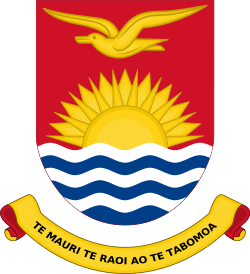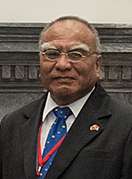Speaker of the House of Assembly (Kiribati)
The House of Assembly of Kiribati has a Speaker, a function adapted from the British Westminster model. The position was established in 1979 by article 71 of the Constitution, when the country became independent from the United Kingdom. It replaced the Speaker of the former House of Representatives existing since 1967, then known as Legislative Council in 1970 and House of Assembly since 1976.[1]
 |
|---|
| This article is part of a series on the politics and government of Kiribati |
|
Article 71 states that the Speaker "shall be elected by the members of the Maneaba [House of Assembly] from among persons who are not members of the Maneaba". His or her function is to "preside at each sitting of the Maneaba" (art.72).
The website of the House of Assembly indicates that his "decision on a point of order is final. He is fully entitled to regulate the conduct of business in all matters not provided in the Rules of Procedure. He has the specific power to decide whether a bill or a motion pertains to money matters, which then requires a minister's signification. He may adjourn a sitting if there is no quorum after an objection is raised by a member".[2]
The Speaker is also a member of the Council of State, the purpose of which is to "perform the duties of the Beretitenti and other executive functions of Government when a motion of no confidence in the Beretitenti or the Government is supported in the Maneaba Ni Maungatabu."[2]
Presidents of the Legislative council of Gilbert and Ellice Islands
| Term | Name | Notes |
|---|---|---|
| 1972-1973 | Sir John Osbaldiston Field | [3] |
| 1973-1976 | John Hilary Smith | [4] |
Reuben Uatioa was the Vice-President of the Legislative council and leader of the government business.[5]
Speakers of the Legislature of Gilbert Islands
| Term | Name | Notes |
|---|---|---|
| 1976-1979 | Rota Onorio | [6][7] |
Speakers of the House of Assembly of Kiribati

| Term | Name |
|---|---|
| 1979–1982 | Rota Onorio |
| 1982–1987 | Matita Taniera |
| 1987–1994 | Beretitara Neeti |
| 1994–2002 | Tekiree Tamuera |
| 2003 | Taomati Iuta |
| 2003–2007 | Etera Teangana |
| 2007–2015 | Taomati Iuta |
| 2016 | Teatao Teannaki |
| 2016–2020 | Tebuai Uaai |
| 2020– | Tangariki Reete |
| Source: Parliament of Kiribati | |
Notes and references
- "Parliament Business – Maneaba ni Maungatabu". www.parliament.gov.ki. Retrieved 29 November 2018.
- "The Speaker", House of Assembly of Kiribati
- "The Parliamentarian: Journal of the Parliaments of the Commonwealth". General Council of the Commonwealth Parliamentary Association. March 23, 1972 – via Google Books.
- "The Parliamentarian: Journal of the Parliaments of the Commonwealth". General Council of the Commonwealth Parliamentary Association. March 23, 1974 – via Google Books.
- "The Parliamentarian". General Council of the Commonwealth Parliamentary Association. March 23, 1975 – via Google Books.
- "The Parliamentarian: Journal of the Parliaments of the Commonwealth". March 23, 1976 – via Google Books.
- "The Parliamentarian: Journal of the Parliaments of the Commonwealth". General Council of the Commonwealth Parliamentary Association. March 23, 1979 – via Google Books.